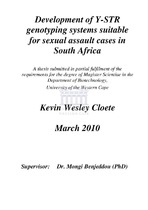Development of Y-STR genotyping systems suitable for sexual assault cases in South Africa
Abstract
Sexual assault is a significant problem facing the South African society. In this context, efficient but also affordable genotyping systems are needed for positive identification of criminals in incidences of sexual violence. The aim of this study was therefore to develop non-commercial Y-STR genotyping systems suitable for sexual assault cases in South Africa. Y-chromosome STR loci constituting the minimal haplotype are still the most widely used loci in investigating sexual assault cases despite the fact that DYS391 and DYS392 have shown low levels of polymorphism in Xhosa populations in Cape Town. The minimal haplotype was, therefore, further investigated in the Cape Muslim population. The Cape Muslim population generally exhibited high GD values among all the South African populations. These values were higher than 0.5 for most loci, and ranged from 0.447 for DYS391 to 0.957 for DYS385. The highest number of alleles in most loci was also recorded in this population. The overall assessment of the minimal haplotype has shown that this system is still a useful in investigating sexual assault case in many South African subpopulations. Therefore the exercise of internal validation of the minimal haplotype system was successfully carried out in the laboratory. The properties of additional novel and widely used STRs were also investigated in this study. Loci were successfully sequenced and allele nomenclature was assigned to them according to the ISFG guidelines.

